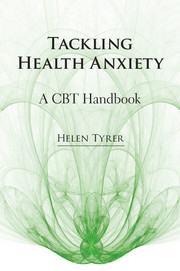Book contents
- Frontmatter
- Dedication
- Contents
- List of tables, boxes, figures and case examples
- Foreword
- Preface
- Part I Principles and practice of CBT for health anxiety
- Part II Presentation and aspects of management of health anxiety, by medical specialty
- 10 Cardiology
- 11 Respiratory medicine
- 12 Gastroenterology
- 13 Endocrinology
- 14 Neurology
- 15 Genitourinary medicine
- 16 Pain management
- 17 Conclusions
- References
- Index
10 - Cardiology
from Part II - Presentation and aspects of management of health anxiety, by medical specialty
Published online by Cambridge University Press: 01 January 2018
- Frontmatter
- Dedication
- Contents
- List of tables, boxes, figures and case examples
- Foreword
- Preface
- Part I Principles and practice of CBT for health anxiety
- Part II Presentation and aspects of management of health anxiety, by medical specialty
- 10 Cardiology
- 11 Respiratory medicine
- 12 Gastroenterology
- 13 Endocrinology
- 14 Neurology
- 15 Genitourinary medicine
- 16 Pain management
- 17 Conclusions
- References
- Index
Summary
Palpitations
Most patients attending cardiology clinics will complain of, or experience, palpitations. This may be their sole presentation or coexist with other symptoms. Palpitations are the conscious awareness of the heart beating. They can vary in speed and rhythm, can be regular or irregular, and tend to be episodic.
Palpitations occur naturally on exercise and in situations that induce a high state of arousal, such as fear or excitement; they can also occur with a fever. Palpitations can also be associated with alcohol withdrawal or a consequence of taking large amounts of caffeine, classically in strong tea or coffee. In some individuals they can also give the sensation of an occasional missed heartbeat due to harmless, naturally occurring, benign extra beats (extrasystoles), where a delayed heart beat is compensated for by a stronger one following; these can also be accentuated by stimulants such as caffeine.
Palpitations can be natural, normal phenomena, but of course may also be present at times in people with confirmed heart disease; most clinically significant palpitations are associated with ischaemic heart disease, thyroid disease and valvular heart disease.
But, and this is a very big ‘but’, they are also very common in anxiety. Clinically significant causes of palpitations include:
• sinus tachycardia (fast regular heart rate due to conditions such as anaemia, heart failure, thyroid disease, infection);
• atrial fibrillation (very common, especially in the elderly, often in the presence of ischaemic heart disease; diagnosed by an electrocardiogram (ECG), but may be intermittent and so only detected on 24-hour recordings; patients may need anticoagulants to avoid strokes);
• Wolff–Parkinson–White syndrome (a form of rapid heart rate also diagnosed by ECG and usually harmless, although occasionally it is troublesome and may require surgical intervention);
• paroxysmal atrial tachycardia (can occur in all ages and is usually harmless; much more serious is ventricular tachycardia – it can require surgery and/or a pacemaker);
• ectopic beats (these are similar to benign extrasystoles, but here the underlying cause is ischaemic heart disease or thyrotoxicosis);
• heart block (conduction abnormality causing a very slow heart rate, may require a pacemaker);
• other rarer arrhythmias.
- Type
- Chapter
- Information
- Tackling Health AnxietyA CBT Handbook, pp. 83 - 94Publisher: Royal College of PsychiatristsPrint publication year: 2013

